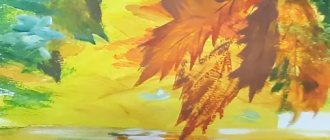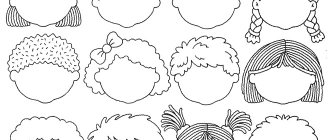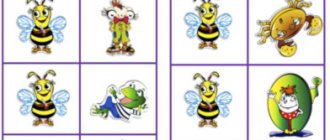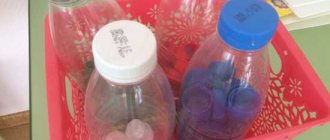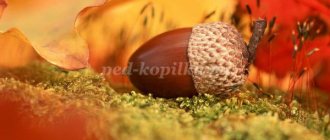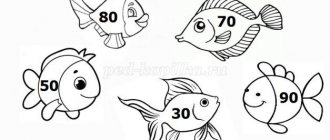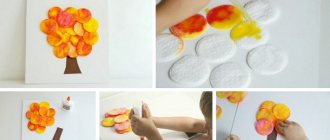Autumn. Games, quizzes, teaching aids on an autumn theme
Add variety to your autumn matinees, entertainment, leisure and other activities with children.
When preparing for them, use the interesting experience of teachers, outlined in the useful publications in this section. From them you can glean a great variety of ideas and ready-made solutions for organizing sports and intellectual competitions on an autumn theme, educational games and fun adventures for preschoolers. Some teachers have taken the path of conducting quizzes about autumn, created in the format of the popular TV show “What? Where? When?”, “KVN” and others. And this calculation fully justified itself, as it had justified before. Look through these pages and choose what you like best! Also pay attention to useful tips on how to make teaching materials and visual aids about autumn with your own hands.
Everything for the successful organization of autumn games and fun activities.
Showing publications 1-10 of 411. All sections | Autumn. Games, quizzes, teaching aids on an autumn theme
Quiz game “What a beautiful autumn!” Municipal preschool educational institution - general developmental kindergarten No. 17 Summary of direct educational activities using ICT on cognitive development for children in the middle group Topic: Quiz game “WHAT A BEAUTIFUL AUTUMN !”
Executor.
Printed board game “Autumn”
Printed board game
“
Autumn ” Description –
the didactic game “
Autumn ” is aimed at the development and formation of speech in children of senior preschool age with mental retardation and speech development disorders.
Age group of pupils: senior preschool age. Type of activity: didactic game Topic : “
Autumn ” .
Autumn. Games, quizzes, teaching aids on an autumn theme - Lapbook for preschool children “Autumn”
Publication “Lapbook for preschool children. »
MBDOU "Kindergarten of a general developmental type" in the village of Pazhga Educator-Denisova Marina Nikolaevna Lapbook for preschool children on the topic: "Autumn" Lapbook is a relatively new teaching tool. Americans were the first to create lapbooks. Relevance "Lapbook" is universal.
Image library "MAAM-pictures"
Visual aid “Beauty Autumn”
This visual aid to summarize the theme “Autumn” was created jointly with older and preparatory-age children with special needs. Performed by teachers Olga Mikhailovna Khitrikova and Elena Petrovna Bulimova. In this work, unconventional drawing techniques were used, where.
Consultation “What autumn has brought us. Or games with natural materials"
“There is nothing useless in nature,” wrote the philosopher Michel Montaigne. One cannot but agree with the statement of this innovator of his time. It is noteworthy that almost all outstanding philosophers and teachers of the past attached great importance to nature as a means of raising children.
Didactic games theme “Autumn” Didactic games theme “Autumn” Didactic game “Stocks of Animals” Objectives: improve the ability to select animals appropriate food, develop attention, memory, observation. Attributes: pictures of animals, pictures of plants and mushrooms. Game progress: play 2.
Autumn. Games, quizzes, teaching aids on the autumn theme - Comprehensive thematic planning and card index of games on the topic “Late Autumn” in the senior group
The article “Complex thematic planning and card index of games on the topic “Late. » COMPREHENSIVE - THEMATIC PLANNING Monday Morning • Conversation “How was the weekend.” • Gymnastics for the eyes “Rain” (card index) • Articulation gymnastics “Cup”, “Ladle” (T.V. Budyonnaya p. 39) • Games at the request of the children. Walk • Bird watching. • Movable.
Lapbook “Autumn” for children 5–6 years old
This multifunctional manual is a thematic interactive folder containing systematic and varied information on the topic “Autumn”. A laptop consists of laminated sheets bound together into a folder - a book, each page of which.
Lapbook “Golden Autumn” for children of the first junior group
Lapbook “Golden Autumn” Prepared by the teacher of the 1st junior group, Shuklina Nadezhda Petrovna MBDOU “Kindergarten No. 33 “Firefly”. In connection with the implementation of the Federal State Educational Standard for preschool education, every teacher is looking for new approaches and ideas in their teaching activities. So I started studying and...
Quest game for the senior group “Riddles of Autumn” Quest game for the senior group “Riddles of Autumn” Children and their teacher go on a journey to cheerful music around the kindergarten. 1. Station “Guess” (signs of autumn. Stop at the gym. Now let’s test your attentiveness and knowledge about autumn. I call you natural ones.
Game-activity “Trees”
Listen to the story and perform various movements
In summer the sun was shining brightly.
A warm breeze blew through the trees. (We wave our palms at ourselves)
Warm rain washed the green leaves. (Rub your cheeks with your fingertips)
And then summer ended, autumn came.
Cold rain pattered on the leaves. (Tapping our fingertips on our cheeks)
The cold wind shook the trees. (Swinging from side to side)
The leaves turned yellow and fell to the ground. (We squat, then stand up)
It became completely cold and the trees fell asleep. (Place your palms under your cheeks)
The trees will wake up in the spring.
It will become warm, the bright sun will shine. (Spread our fingers in front of us)
New leaves will grow on the trees.
Warm rain will wash the green leaves. (Shaking hands)
Game "Wind and Trees"
One of the players plays the role of the wind. The rest are trees. They stand with their arms raised up and slightly apart. The wind blows, weakly or strongly, and the trees sway accordingly.
Didactic games on the theme Autumn card index (middle group) on the theme
Download:
| The attachment | Size |
| didakticheskie_igry_tema_osen.docx | 22.45 KB |
Preview:
Didactic games theme “Autumn”
Didactic game “Stocks of animals”
Objectives: improve the ability to select appropriate food for animals, develop attention, memory, and observation skills. Attributes: pictures of animals, pictures of plants and mushrooms.
Progress of the game: 2 children play. One by one, they take a card with a picture of a plant or mushroom, say what it is, and put it next to the picture of a certain animal.
Note: the game can be individual.
Didactic game “What juice?” (“What jam?”)
Objectives: improve the ability to distinguish and name fruits, learn to form adjectives, develop oral speech, attention, memory.
Attributes: basket, pictures of fruits
Progress of the game: children take turns taking a picture from the basket, calling the pictured fruit and saying what the juice (or jam) from this fruit will be called. For example:
“This apple is apple juice.”
Didactic game “Which tree is the leaf from?” »
Objectives: improve the ability to differentiate trees by their trunks and leaves, develop attention, observation, memory, imagination.
Attributes: trunks of three different trees drawn on separate sheets, autumn leaves of these trees.
Progress of the game: leaves lie scattered around the drawings of tree trunks. Children should
spread the leaves on your tree
Note: the game can be played in group or individual form.
Didactic game “Which sheet?”
Objectives: improve knowledge of distinguishing the leaves of three trees, teach how to form
adjectives, develop oral speech, attention, memory.
Attributes: basket, autumn leaves.
Progress of the game: children sit in a circle and pass the basket to each other. One by one they take out a piece of paper,
they say what tree it comes from and form an adjective. For example: this is a sheet with
birch - birch leaf.
Didactic game “Paired Pictures”
Objectives: learn to correlate pairs of pictures according to the principle of “the whole and its part”, develop logical thinking, attention, observation, and oral speech.
Attributes: a set of paired pictures on an autumn theme, where in each pair of pictures a whole image is drawn on one, and on the other its separate part in the form of a separate object (for example: a bird on an autumn branch - an autumn branch).
Progress of the game: 2 children play, one has a set of pictures with a whole image, the second has
pictures with individual objects. One child takes any of his cards,
and the other must choose a steam room for her, explaining his choice. Then the second
Posts his picture, and the first child selects a match for it.
Note: the game can be individual.
Didactic game “Clap your hands”
Objectives: to consolidate the ability to hear the names of vegetables and fruits,
find them in pictures, develop auditory attention,
Attributes: subject pictures on the topic
Progress of the game: a poem is read, children must remember and name the vegetables (or fruits, or berries, or mushrooms depending on the topic) that were mentioned in the poem, and show or post pictures from them
image. When the poem is read a second time, children
clap their hands if they hear the name of a vegetable (fruit, berries, mushrooms).
Didactic game. AUTUMN
1. “What happens in the fall?”
Goal: to consolidate the concept of autumn phenomena, to activate the vocabulary on the topic.
Equipment: story pictures depicting different seasons.
Move. On the table are mixed pictures depicting various seasonal phenomena (it is snowing, a flowering meadow, an autumn forest, a starling in a birdhouse, etc.). The child chooses pictures that depict only autumn phenomena and names them himself or with the help of an adult. Example. The sun is hiding behind the clouds. It's raining. The leaves on the trees are yellow and red. Birds fly south. Animals are preparing supplies for the winter. People put on coats and raincoats, etc.
"Autumn Leaves" (lotto)
Goal: expand the vocabulary on the topic “Autumn. Trees”, teach how to correctly use nouns in the genitive case.
Equipment: autumn leaves of birch, oak, maple and linden, glued onto one large card, and onto separate cards.
Move. The game is played after getting acquainted with autumn leaves on a walk. There is a large card in front of the child. Small ones are stacked nearby. He takes one small card and determines which tree leaf he has: “This is a maple leaf,” etc. Then he looks for the same leaf on a large card and puts a small one on it. A non-speaking child is asked to find and show a leaf of a maple, birch, etc.
Goal: learn to form nouns with diminutive suffixes.
Equipment: subject pictures depicting large and small vegetables.
Move. An adult shows the child a picture of a large vegetable, for example, a tomato, and asks what it is called. Then he explains: “This tomato is big. What would you affectionately call a small vegetable like this?” Shows a picture (tomato.) Other vegetables are considered similarly (cucumber - cucumber, turnip - turnip, carrot - carrot, onion - onion, potato - potato). A non-speaking child is asked: “Show me the tomato. Now show me the tomato.”
“Which vegetable did you miss?”
Goal: activation of vocabulary on the topic, development of attention and visual memory.
Equipment: “Hare” toy, natural vegetables or dummies.
Move. The adult shows the child the hare and explains that today is his birthday. Guests came and brought many gifts. An adult places vegetable gifts in front of the hare, listing them. He doesn't name one vegetable. The child must guess which one. He names or shows it depending on the level of speech development.
Goal: activation of vocabulary on the topic, teaching the correct use of nouns in the accusative case.
Equipment: pictures of vegetables or natural vegetables.
Move. The adult asks the child to “cook” a treat for him (cabbage soup or salad). The child selects the necessary vegetables for the dish and names them. Then he explains how he will prepare this “treat” (take, wash, peel, cut, cook).
Goal: to teach to identify an object by its characteristics, to activate the vocabulary on the topic.
Equipment: “Hare” toy, bag, natural vegetables or dummies.
Progress: An adult explains to the child that the bunny wants to play with him, ask riddles: “The bunny will find some vegetable in the bag and tell you about it, and you must guess what it is.” Zaika's riddles: “Long, red (carrot). Green, long (cucumber). Round, red (tomato)”, etc.
A selection of didactic games and exercises on the theme “Autumn” for children of senior preschool age
Larisa Malysheva
A selection of didactic games and exercises on the theme “Autumn” for children of senior preschool age
Working as a speech development teacher at a preschool educational institution, my responsibilities include, in addition to conducting classes, organizing individual and preliminary work. I would like to bring to your attention didactic games and exercises aimed at developing coherent speech, the formation of the lexical and grammatical structure of speech and word formation skills in children of senior preschool age on the topic “Autumn”.
"Signs of Autumn"
Goal: to clarify children’s ideas about autumn signs, to activate vocabulary on the topic.
Equipment: story pictures depicting different seasons.
Procedure: The teacher offers children pictures depicting various seasonal phenomena (it is snowing, the sun is shining, an autumn forest, snowdrops in the forest). The child chooses pictures that depict only autumn phenomena and names them.
Looking at illustrations on the theme “Autumn”
Goal: Continue to expand children’s understanding of autumn, its signs and phenomena, continue to teach children to answer questions using common sentences.
Reading the poem by F. I. Tyutchev “There is in the original autumn”
Goal: To help children feel the beauty of nature in the poem, to enrich children’s speech with figurative expressions.
Conversation on the read work of I. Sokolov - Mikitov “Falling Leaves”
Goal: Continue to teach children to answer the teacher’s questions about the work they read, using grammatically correct sentences.
Did. game "One - many"
Goal: Continue to teach children to agree adjectives with nouns when changing number.
Progress: sunny day - sunny days; a beautiful tree-, a gloomy cloud-, a gray cloud-, cold rain-, a strong wind-, a flock of birds-, a deep puddle-, a rubber boot-... etc.
Did. game "Box with autumn tales"
Goal: Continue to teach children to use substitute objects as images when composing fairy tales.
Material: box, 6-8 circles of different colors.
Move: The player takes a circle out of the box, comes up with who it is or what it is in a fairy tale. After the player says 3-4 sentences, the second player begins (continues the tale). When the tale is told, the mugs are collected in a box.
Did. game "Say the opposite"
Goal: to activate adjectives with opposite meanings in children’s dictionaries.
Move: big - small, smart - stupid, light - dark, clean - dirty, kind - evil, cold - hot, sunny - cloudy, new - old, sad - cheerful, etc.
Did. ex. "Pick an action"
Goal: Continue to activate verbs in children's vocabulary.
Progress: What do leaves do in the fall? (turn yellow, fall, fly, etc.) Rain in autumn (fall, drizzle, etc.) Birds in autumn (fly away, get ready, etc.) Trees in autumn (drop leaves, fall asleep, etc.) Animals in the fall (preparing for winter, changing coats, etc.)
Introduction to sayings
Goal: Continue to teach children to understand the figurative meaning of proverbs and sayings.
“There is no turn from autumn to summer. Summer with sheaves, autumn with pies. In October, neither on wheels nor on runners. In September there is one berry, and even that bitter rowan. Autumn is stocky, winter is tidy. September is cold, but full
Did. game "Whose Leaves"
Goal: Continue to teach children to form possessive adjectives
Progress: The teacher invites the children to look at the pictures and determine which leaf of the tree is in his hands. (poplar leaf - poplar, birch, willow, rowan, oak, maple, etc.)
Development of coherent speech in children of senior preschool age Teaching coherent speech is one of the most difficult methodological tasks of preschool education and development. Development of coherent speech in preschoolers.
Playercube - a universal aid for the development of vocabulary and grammatical standing of speech GAME GUIDE “SPEECH CUBE” The speech cube or playerube is a universal aid for working with children, both junior and senior preschoolers.
Website "Children's joys"
aimed at preschool and primary school age children, for parents, educators, teachers
For preschool age
Preschool children will be interested in the following sections: online games, online coloring books, children's songs and children's karaoke.
| Good Deeds Day | Make words from letters | Color by numbers | Songs about mom | Interactive fairy tales |
In addition, parents can download for kids:
— coloring pages and copybooks for printing;
— computer games and programs for installation on a computer;
— information about the upbringing and health of the child, as well as safety at home and on the street;
— preschool employees will find auxiliary material for teaching children mathematics, writing, reading, visual aids for learning and developing perception of the world around them, as well as material for organizing groups in kindergarten.
For primary school age
Older children will be attracted by the sections: online tests, online scanwords.
| What kind of mother are you? | How sociable are you? | Do I want to go to school? | Are you in love? | Crosswords with pictures |
For school it is suggested to download:
— electronic publications and audiobooks for the school curriculum and for extracurricular reading;
— training programs for installation on a computer;
— auxiliary material (musical, for printing) for the design of classes and events;
— forms of diplomas, inserts, diplomas, lesson schedules.
Parents for home leisure
The section “Activities and leisure time at home with children” is dedicated directly to parents:
Those who are interested in working in Photoshop and editing video materials will find this auxiliary material useful:
Here you will find children's photo frames and photo templates, layouts for designing portfolios and photo books, complement your memorable video with a beautiful screensaver with footage, which you will decorate with a beautiful cover.
Selection of materials
Everyone will find something useful and entertaining on our website. If you have material that you want to share, you can post it on the site. You can also supplement any material on the site in the comments to the material.
Didactic games for children about AUTUMN
October 10, 2017
The purpose of didactic games is the process of teaching children some knowledge and skills.
It's autumn outside, which means it's time for educational games for children about this wonderful time of year.
I offer you several such games for preschool and primary school children.
To play you need a ball.
An adult throws a ball to the child and names a tree.
The child returns the ball, while forming a phrase by adding an adjective to the name of the tree.
- birch - golden birch,
- oak - mighty oak,
- larch - red larch,
- spruce - prickly spruce...
Presentation “Didactic material on the theme “Autumn” (senior group)
The influence of sensory integration on a child with disabilities in the preschool period
- Certificate for each participant
- Discount on courses for all participants of the online conference
Hurry up to sign up before December 17th!
Description of the presentation by individual slides:
Didactic material on the topic “Autumn” Prepared by: Polienko N.F.
What time of year is the poem talking about? Prove it with words from the text.
Name the signs of autumn
Come up with a title for the poem. Multi-colored leaves fly in a joyful waltz. The wind dances with autumn, And the falling leaves swirl.
Which tree is the leaf from?
What kind of leaf? Leaf from a birch - birch leaf Leaf from a rowan - Leaf from an aspen - Leaf from an oak - Leaf from a chestnut - Leaf from a maple -
What grows in the garden? What's growing in the garden?
You can prepare many delicious dishes from vegetables. Let's make a menu. — Mashed potatoes (mashed potatoes) Beet salad (beet salad) Carrot juice (carrot juice) Cabbage pie (cabbage pie) Pumpkin casserole (pumpkin casserole) Onion soup (onion soup)
How animals prepare for winter. Name those drawings in which the animals depicted are preparing for winter. Tell me how they do it.
Didactic game “Tops and Roots”
Assignment: “What did autumn give us?”
Listen to the story and retell it looking at the picture.
Write a story about autumn
Thank you for your attention!
The influence of sensory integration on a child with disabilities in the preschool period
- Certificate for each participant
- Discount on courses for all participants of the online conference
Hurry up to sign up before December 17th!
- all materials
- Articles
- Scientific works
- Video lessons
- Presentations
- Notes
- Tests
- Work programs
- Other methodological materials
A didactic game is an excellent learning and development tool used in mastering any program material. The didactic games and exercises proposed in the presentation are aimed at clarifying and consolidating the signs of the onset of autumn in living and inanimate nature, at systematizing children’s ideas about the state of plants in early autumn, about the diversity of fruits and seeds, about the life of animals in autumn, and at developing all components of oral speech.
- Polienko Nadezhda FedorovnaWrite 46 09/27/2020
Material number: DB-1316978
- Preschool education
- Presentations
- 27.09.2020 0
- 27.09.2020 0
- 27.09.2020 0
- 27.09.2020 0
- 27.09.2020 0
- 27.09.2020 0
- 27.09.2020 0
- 27.09.2020 0
Didn't find what you were looking for?
You might be interested in these courses:
Leave your comment
Responsibility for resolving any controversial issues regarding the materials themselves and their contents is taken by the users who posted the material on the site. However, the site administration is ready to provide all possible support in resolving any issues related to the work and content of the site. If you notice that materials are being used illegally on this site, please notify the site administration using the feedback form.
All materials posted on the site were created by the authors of the site or posted by users of the site and are presented on the site for informational purposes only. Copyrights for materials belong to their legal authors. Partial or complete copying of site materials without written permission from the site administration is prohibited! The opinion of the administration may not coincide with the point of view of the authors.
Game-activity “Autumn” for children 3 years of age
Summary of a lesson in a playful way for children of the third year of life, topic: “Autumn”
Author: Davydova Svetlana Alekseevna.
Equipment:
Autumn leaves large and small. Leaves of yellow, red and green colors cut out of cardboard and vases (trays, bags, etc.) of the same colors. Puddles cut out of oilcloth. Nuts, a “squirrel” toy, a plastic bottle with a “hollow” cut out. Plasticine in yellow, red and green colors, sheets of paper with a painted tree. Wooden spatulas with red, yellow, green clothespins attached to them. Flowers and flower beds cut from egg cages, finger paints. Glue, sheets of paper with a background “autumn, tree trunks without a crown). Musical children's instruments. Audio recordings: “Waltz of the Flowers” by P. I. Tchaikovsky, song “Autumn, autumn has come, the leaves are falling.”
Game-activity “Picking plums”
We listen to poems and perform various movements.
The plums are ripe in the garden.
They are delicious and beautiful. (We put our hands forward and spread them a little to the sides)
But all the plums are high
And they are not easy to get. (Raise our hands up)
To pick plums for us,
We will bend the branches. (Raise our hands up and jump in place)
Nothing succeeded,
We'll try again. (Repeat jumping with arms raised up)
We brought the ladder
We climb on it
We pick plums easily.
Game "Plums"
The teacher shows the children five plums of different colors - yellow, red, burgundy, blue, purple (ovals cut out of paper). On command, children close their eyes. The teacher removes one of the plums or changes its place, and then asks the children to open their eyes. They must say what has changed. In the future, you can complicate the task: make two or three changes at the same time.
